A series of Sherlock Holmes films, first released more than a century ago, has been restored - and will soon be shown on screen for the first time since 1922.
Forty-five films featuring the famous literary sleuth were made in the early 1920s.
The reels were brought up from the British Film Institute (BFI) National Archive vault to be inspected and are being cleaned, digitised and tinted.
Three of the films that have undergone restoration will be shown at Alexandra Palace Theatre in north London on 16 October as part of the BFI London Film Festival.
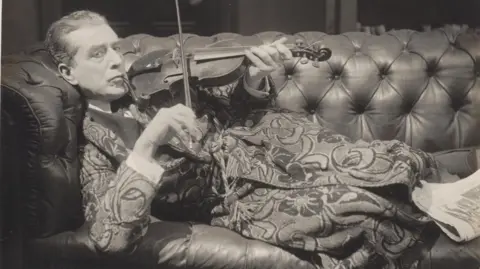 BFI National Archive
BFI National ArchiveBryony Dixon, BFI's silent film curator, said: "There’s been a demand for these for years.
"People are waiting with bated breath for basically the last of the silent Sherlock Holmes films - the last ones to be restored in the whole world.
"The Stoll Sherlock Holmes series has never been publicly available. We hope to do it proud - but it is a big project.”
The fictional detective, who resided at 221B Baker Street, is one of London's most famous literary characters.
Sherlock Holmes has been played by famous actors - from Michael Caine to Ian McKellen, and more recently Benedict Cumberbatch and Henry Cavill.
Eille Norwood played the sleuth in the series of films the BFI is restoring.
Author of the original stories, Arthur Conan Doyle, approved their adaptation and remarked of Norwood: "His wonderful impersonation of Holmes has amazed me".
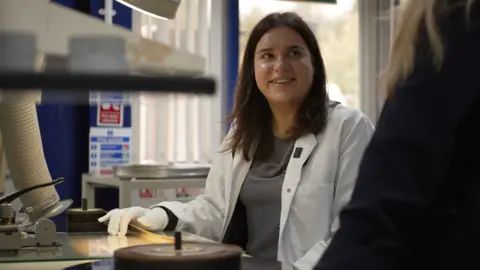 BBC/David Perella
BBC/David PerellaThe first stage of restoration at the BFI National Archive in Berkhamsted, Hertfordshire, is to wind the delicate, century-old film across a lightbox, where it is inspected frame by frame.
Elena Nepoti, film conservation manager, said: "Generally it’s a moment of joy because you never know what’s inside the film can - so it’s a bit like Christmas.
"But of course every time you take some nitrate from the vault there’s always a sense of joy - and fear.”
The films are cleaned by hand and then sent to be digitised.
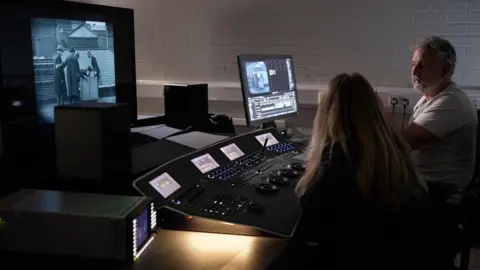 BBC/David Perella
BBC/David PerellaIn a dark room, Ben Thompson is stabilising the picture, reducing blur, taking away flickers and removing dirt. On the screen in front of him is a scene from The Golden Pince-Nez from 1922.
"This is the first shot in a reel so this has at some point been on the floor - as the projectionist is rewinding. This is historic dirt we’re looking at,” he said.
For each area needing restoration because of a scratch or mark, he finds the equivalent area on the next or previous frame and uses computer software to patch over the damaged part.
“It works tremendously well when it comes to tidying up these large regions where there are scratches," he said.
"But if there is movement between frames, it won't match up, and this is where the long nights come in."
The BFI restorers need to be sleuths themselves when deciding how the original Sherlock Holmes films would have looked.
Often they are working from safety stock made in the 1950s - copies created so that if the volatile nitrate films were destroyed, the films would not be lost.
The restored versions are carefully tinted - some scenes are blue to denote a night time or flashback scene. Others are orange for a scene lit by electric light.
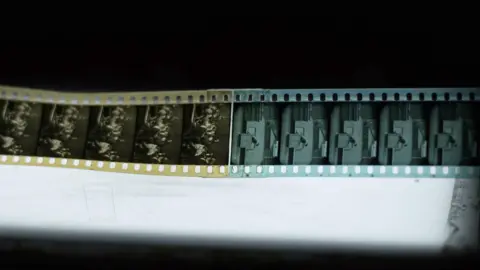 BBC/David Perella
BBC/David PerellaThe three restored films - A Scandal in Bohemia, The Golden Pince-Nez and The Final Problem - will be screened to a live score specially composed and performed by the Royal Academy of Music Soloists Ensemble, conducted by Joanna MacGregor.
Listen to the best of BBC Radio London on Sounds and follow BBC London on Facebook, X and Instagram. Send your story ideas to hello.bbclondon@bbc.co.uk

.jfif)
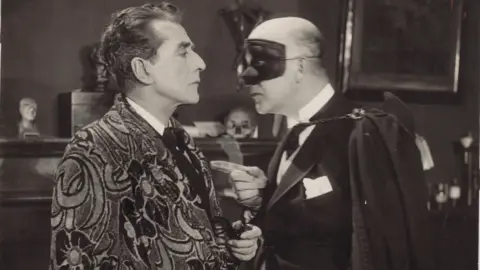
Post a Comment